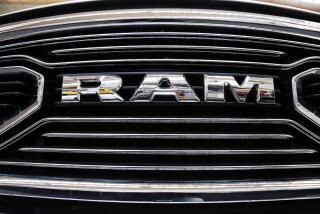GM fined $35 million for faulty ignition switch recall delays

General Motors will pay $35 million in a settlement with the federal government over its failure to swiftly report a defective ignition switch in two-and-a-half million smaller cars.
Federal regulators Friday fined General Motors Corp. the maximum $35 million for delays in recalling vehicles with faulty ignition switches that have been linked to 13 deaths.
The automaker also agreed to what Transportation Secretary Anthony Foxx called “unprecedented oversight requirements” to ensure future safety problems aren’t lost in the company’s bureaucracy and are quickly reported to regulators.
“Crashes happened and people died,” Foxx said. “Had GM acted differently, perhaps some of this tragedy might have been averted.”
For at least a decade, GM knew about problems with the ignition switch, which unintentionally can turn off the vehicle, disabling the power steering and airbags.
But the company only began recalling vehicles in February.
So far, GM has recalled 2.6 million vehicles globally, including 2003 to ’07 Saturn Ions, 2007 to ’10 Saturn Skys, 2006 to ’11 Chevrolet HHRs, 2006 to ’10 Pontiac Solstices, and 2005 to ’10 Chevrolet Cobalt and Pontiac G5 models.
“The fact remains that GM did not act and did not alert us in a timely manner,” Foxx said. “What GM did was break the law. They failed to meet their public safety obligations and today they have admitted as much.”
As part of a consent agreement that ends an investigation by the National Highway Traffic Safety Administration, GM agreed to the largest civil fine ever levied by the agency for a recall-related violation.
Automakers are required to tell NHTSA of safety-related defects within five days of learning about them.
GM also agreed to “make significant and wide-ranging internal changes” to how it handles safety problems. The company also agreed to “unprecedented and immediate reporting” of potential safety defects it is internally reviewing and broad transparency into such activities for up to three years.
“The fact that GM took so long to report this defect says something was very wrong with the company’s values,” said David Friedman, acting NHTSA administrator.
“GM must rethink the corporate philosophy reflected in the documents we’ve reviewed, including training materials that explicitly discouraged employees from using words like “defect,” “dangerous,” “safety-related” and many more essential terms for engineers and investigators to clearly communicate up the chain when they suspect a problem,” he said.
GM said the company has started reviewing its policies and internal processes “to avoid future recalls of this nature.”
“We have learned a great deal from this recall. We will now focus on the goal of becoming an industry leader in safety,” said Chief Executive Mary Barra. “We will emerge from this situation a stronger company.”
Foxx said federal officials realize no company is perfect.
“What we cannot tolerate, what we will never accept, is a person or a company that knows danger exists and says nothing,” Foxx said. “Literally, silence can kill.”
The Justice Department also is investigating why GM did not recall the vehicles sooner.
Foxx admitted the $35 million fine is “a rounding error” for a company the size of GM. That’s why he’s asking Congress to increase the maximum fine to $300 million.
Clarence Ditlow, executive director of the Center for Auto Safety, said Congress should allow unlimited civil penalties and criminalize such recall-related violations.
With the NHTSA investigation settled, “the big issue is what is the Department of Justice going to do?” he said. He wants it to levy a more than a $1-billion fine and bring criminal charges against GM officials found to be responsible for the delays.
“People died,” Ditlow said. “Justice demands more than a $35-million slap on the wrist to a $100 billion corporation like GM when it kills consumers.”







